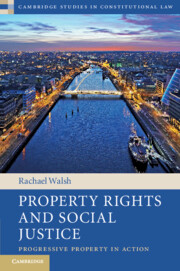Book contents
- Property Rights and Social Justice
- Cambridge Studies in Constitutional Law
- Property Rights and Social Justice
- Copyright page
- Dedication
- Contents
- Acknowledgements
- 1 Progressive Property in Action
- 2 Understanding Progressive Property
- 3 Property as Ideology, Individual Right, and Institution
- 4 Engaging Constitutional Property Rights
- 5 Standards of Review and the Form of Constitutional Property Rights
- 6 Adjudicating Fairness
- 7 Security of Possession in a Progressive Constitutional Context
- 8 Security of Value in a Progressive Constitutional Context
- 9 Learning from Progressive Property in Action
- Bibliography
- Cases
- Index
- Cambridge Studies in Constitutional Law (continued from page ii)
8 - Security of Value in a Progressive Constitutional Context
Published online by Cambridge University Press: 28 May 2021
- Property Rights and Social Justice
- Cambridge Studies in Constitutional Law
- Property Rights and Social Justice
- Copyright page
- Dedication
- Contents
- Acknowledgements
- 1 Progressive Property in Action
- 2 Understanding Progressive Property
- 3 Property as Ideology, Individual Right, and Institution
- 4 Engaging Constitutional Property Rights
- 5 Standards of Review and the Form of Constitutional Property Rights
- 6 Adjudicating Fairness
- 7 Security of Possession in a Progressive Constitutional Context
- 8 Security of Value in a Progressive Constitutional Context
- 9 Learning from Progressive Property in Action
- Bibliography
- Cases
- Index
- Cambridge Studies in Constitutional Law (continued from page ii)
Summary
This chapter illustrates how the core progressive property tension between guarding against unfair exploitation and avoiding excessive constraint of legislative freedom translates into compensation doctrine. It considers the nature and degree of constitutional protection for security of value that has resulted from the Irish property rights guarantees, including a presumptive entitlement to full compensation for deprivations, and a presumptive lack of entitlement to compensation for regulatory interferences falling short of deprivation. That analysis demonstrates how constitutional property law can combine rule-based and contextual judicial decision-making to generate relatively predictable legal principle. It further illustrates the running theme of judicial deference to political decision-making concerning the mediation of property rights and social justice, since the courts have created space for legislative exceptions to presumptive compensation entitlements to secure social justice.
Keywords
- Type
- Chapter
- Information
- Property Rights and Social JusticeProgressive Property in Action, pp. 197 - 234Publisher: Cambridge University PressPrint publication year: 2021

